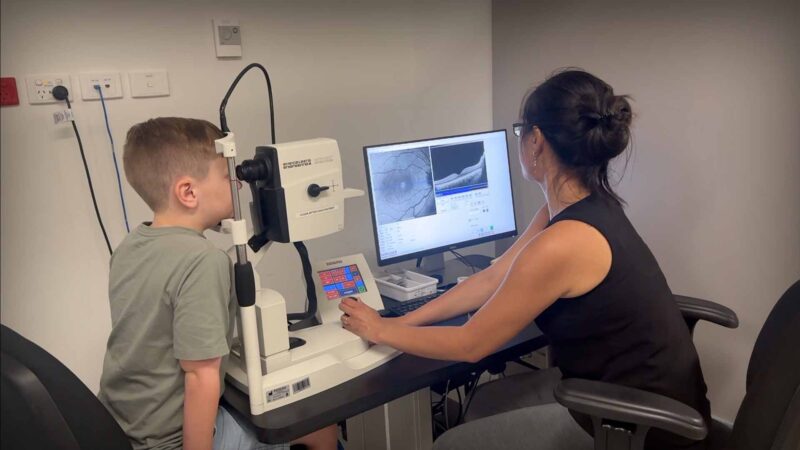RESEARCHER PROFILE
Associate Professor Johan Verjans
(Filmed in Adelaide, South Australia, May 2024)
SAHMRI – Platform AI
Deputy Director, Medical Machine Learning, Australian Institute for Machine Learning
Platform Leader AI, SAHMRI
Consultant Cardiologist, Royal Adelaide Hospital / Jones Radiology
Associate Professor Johan Verjans is a clinician-scientist with a strong focus on cross-disciplinary translational research. In his role as Deputy Director at the Australian Institute for Machine Learning (AIML)—one of the world’s premier machine learning institutes, with over 200 researchers—and as Group Leader of Artificial Intelligence at the South Australian Health and Medical Research Institute (SAHMRI), he integrates his expertise in molecular medicine, clinical research, and advanced imaging with machine learning applications. This unique combination enables him to drive the translation of cutting-edge AI research into practical medical applications. He works with global teams from multinationals on AI problems.
Johan Verjans graduated in medicine from Maastricht University through the prestigious MD-PhD track, during which he was awarded the DiPalma Fellowship. This fellowship allowed him to work with renowned Professor Narula at institutions such as UC Irvine and in Philadelphia. He further honed his skills in cardiology and research through a postdoctoral fellowship at Massachusetts General Hospital/Harvard Medical School, supported by the prestigious Dutch Science Foundation’s Rubicon Fellowship. He later completed his cardiology training at the University Medical Centre Utrecht, where he was awarded a clinician-scientist fellowship.
In 2017, he was recruited by the University of Adelaide and SAHMRI, and he established the Medical Machine Learning group at AIML. Since then, the multidisciplinary team has expanded to over 40 members and includes clinicians, biomedical researchers, and computer scientists. Their goal is to position the University of Adelaide as a global leader in AI-driven healthcare by leveraging AIML’s world-class expertise in machine learning. He currently is the Future Industry Fellow at the University of Adelaide.
Prof. Verjans has made significant contributions to the field of cardiology and molecular diagnostics with his research published in high-impact journals, including Circulation (IF 23.6), JACC (IF 20.6), Nature Reviews Cardiology (IF 20.3), and Basic Research in Cardiology (IF 12.6). Additionally, he has published six articles in the top-ranked imaging journal JACC: Cardiovascular Imaging (IF 12.7) and other prestigious outlets such as Light: Science and Applications (IF 15) and IEEE Transactions on Medical Imaging (IF 13.94).
His team of computer scientists has published last year in leading AI conferences such as CVPR (ranked second on Google’s h5 index), MICCAI, and ICCV. Notably, his group pioneered advancements in Medical Visual Question Answering (VQA), winning the first global challenge on the subject organized by the NIH—a remarkable achievement in one of the most challenging areas of machine learning.
Beyond his academic work, Prof. Verjans is actively involved in applying AI to digital health and pushing solutions into the clinical realm. He has initiatives using the Caremappr platform to generate actionable insights for mental health, automate pharmacy review, enhance adherence to cardiology guidelines, and helping SA Health with novel solutions. His group created the algorithm for a world’s first cluster-randomised controlled trial, using AI in the Emergency Department for Chest pain, which was presented as late breaking clinical trial in 2024 at the largest cardiology conference ESC.
Through collaborations with industry his work continues to push the boundaries of AI in healthcare, driving both scientific discovery and practical medical innovations.
You Might also like
-
Seeking discoveries in earlier bowel cancer detection
Associate Professor Susan Woods is a cancer research focused on eradicating bowel cancer through earlier detection and investigating the DNA related from colorectal cancer cells. She leads the Gut Cancer Research Group at the University of Adelaide and SAHMRI and with her team is researching new treatments for advanced disease.
-
Genetics of the choroid and impact on eye health
Professor Daniel Fatovich is a senior emergency physician and clinical researcher at Royal Perth Hospital Emergency Department (ED), with over 30 years’ experience in the design and conduct of clinical research in Emergency Medicine. He is also Head of the Centre for Clinical Research in Emergency Medicine (CCREM) within the Harry Perkins Institute of Medical Research.
-
Interventions for improving outcomes of children who are deaf or hard of hearing
Dr Rithin Nedumannil (MBBS, MPH, FRACP, FRCPA) is a PhD candidate at the University of Melbourne, undertaking his doctoral studies in collaboration with the Cambridge Stem Cell Institute (Cambridge, UK) and the Peter MacCallum Cancer Centre (Melbourne, Australia). He is a clinical haematologist and haematopathologist with current appointments at Peter MacCallum Cancer Centre, the Royal Melbourne Hospital, Austin Health and Northern Health.



